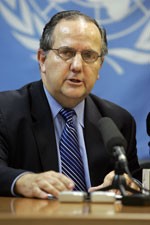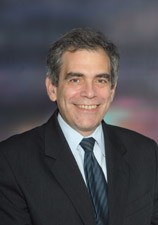Keynote: A conversation with Juan E. Méndez and David Marwell
Juan E. Méndez

Juan E. Méndez is President of the International Center for Transitional Justice. From July 2004 through March 2007, he also served concurrently as the Special Advisor to the Secretary- General of the UN on the Prevention of Genocide. A native of Lomas de Zamora, Argentina, Mr. Méndez has dedicated his legal career to the defense of human rights and has a long and distinguished record of advocacy throughout the Americas. As a result of his involvement in representing political prisoners, the Argentinean military dictatorship arrested him and subjected him to torture and administrative detention for more than a year. During this time, Amnesty International adopted him as a "Prisoner of Conscience." After his release from detention in the late 1970s, Mr. Méndez moved to the United States.
For 15 years, he worked with Human Rights Watch, concentrating his efforts on human rights issues in the western hemisphere. In 1994, he became general counsel of Human Rights Watch, with worldwide duties in support of the organization's mission, including responsibility for the organization's litigation and standard-setting activities. From 1996 to 1999, Mr. Méndez was the executive director of the Inter-American Institute of Human Rights in Costa Rica, and between October 1999 and May 2004 he was professor of Law and director of the Center for Civil and Human Rights at the University of Notre Dame, Indiana. Between 2000 and 2003 he was a member of the Inter-American Commission on Human Rights of the Organization of American States, and served as president in 2002. In July 2004, Mr. Méndez was appointed the United Nations special adviser on the prevention of genocide, a post that was complementary to his full-time position as the president of the ICTJ.
Mr. Méndez is a member of the boards of directors of the Center for Justice and International Law, Global Rights, and the Open Society Justice initiative. He is on the board of advisors of the Social Science Research Council's Conflict Prevention and Peace Forum, and the advisory council of the American Bar Association Center for Human Rights. He has taught International Human Rights Law at Georgetown Law School and at the Johns Hopkins School of Advanced International Studies, and he teaches regularly at the Oxford Masters Program in International Human Rights Law in the United Kingdom. He is the recipient of several human rights awards, the most recent being the inaugural Monsignor Oscar A. Romero Award for Leadership in Service to Human Rights, presented by the University of Dayton in April 2000, and the Jeanne and Joseph Sullivan Award of the Heartland Alliance in May 2003. Mr. Méndez is a member of the bar of Mar del Plata and Buenos Aires, Argentina, and the District of Columbia, US. He earned a JD from Stella Maris University in Argentina and a certificate from the American University, Washington College of Law.
David Marwell

The subject of the Holocaust and its meaning in contemporary society has been a focal point of Dr. Marwell's career since 1980. He served as the Chief of Investigative Research at the U.S. Department of Justice, Office of Special Investigations, where he conducted historical research in support of prosecution of Nazi war criminals living in the United States. He also played a major role in the Justice Department's investigations of Klaus Barbie and Josef Mengele. From 1988 to 1994, Dr. Marwell was the Director of the Berlin Document Center, where he managed the archive and records repository and supervised the microfilming of the Center's 25 million Nazi-era personnel files, and subsequently oversaw the transfer of the Center's administration to the German government.
Since joining the Museum of Jewish Heritage - A Living Memorial to the Holocaust in late 2000 as Director, Dr. Marwell has overseen the Museum's capital expansion, an 82,000 SF project that nearly quadrupled the physical space of the Museum. The Robert M. Morgenthau Wing, which opened in September 2003, was the first new construction to begin in Lower Manhattan after September 11 terror attacks. Prior to coming to New York, Dr. Marwell was the Associate Director for Museum Programs at the United States Holocaust Memorial Museum in Washington, D.C. His role at the museum involved the supervision of the museum's educational programs, museum services, collections, exhibitions, and the expansion of the Museum's technological and web-based information services. These areas served not only Museum visitors but also provided research and education resources to scholars, educators, and potential visitors around the world.
Prior to his tenure at the USHMM, Dr. Marwell was the Executive Director of the JFK Assassination Records Review Board from 1994-1997. He has also served as an expert witness and consultant to the governments of Canada and Australia on several war crimes prosecutions, and was a member of the Interagency Working Group for Nazi War Criminal Documents. Dr. Marwell is a graduate of Brandeis University with a B.A. in English, and of the State University of New York at Binghamton with a Ph.D. in Modern European History. He is married and the father of two sons.
Peter Rosenblum
Peter Rosenblum is the first holder of the Lieff, Cabraser, Heimann & Bernstein Clinical Professorship of Human Rights Law at ColumbiaUniversity's School of Law. He came to Columbia from Harvard Law School, where he spent 7 years with the Human Rights Program. Before taking a full time university position, Professor Rosenblum worked with many of the major international human rights groups, including Human Rights Watch, the Human Rights Law Group, and the Lawyers Committee for Human Rights, as well as the United Nations. He has been a member of the UN Secretary General's Advisory Group on the Democratic Republic of the Congo and the Human Rights Watch Africa Division Advisory Committee. He has been a consultant to the Carter Center, and serves on the boards of several NGOs. His current workaddresses the confluence of natural resource and human rights issues around the world, with special emphasis on Africa as well as studies in the evolution of the human rights movement worldwide.
CHRDR Conference: 4-6 October 2007
Human Rights Archives and Documentation:
Meeting the Needs of Research, Teaching,
Advocacy and Social Justice
Selected Proceedings


